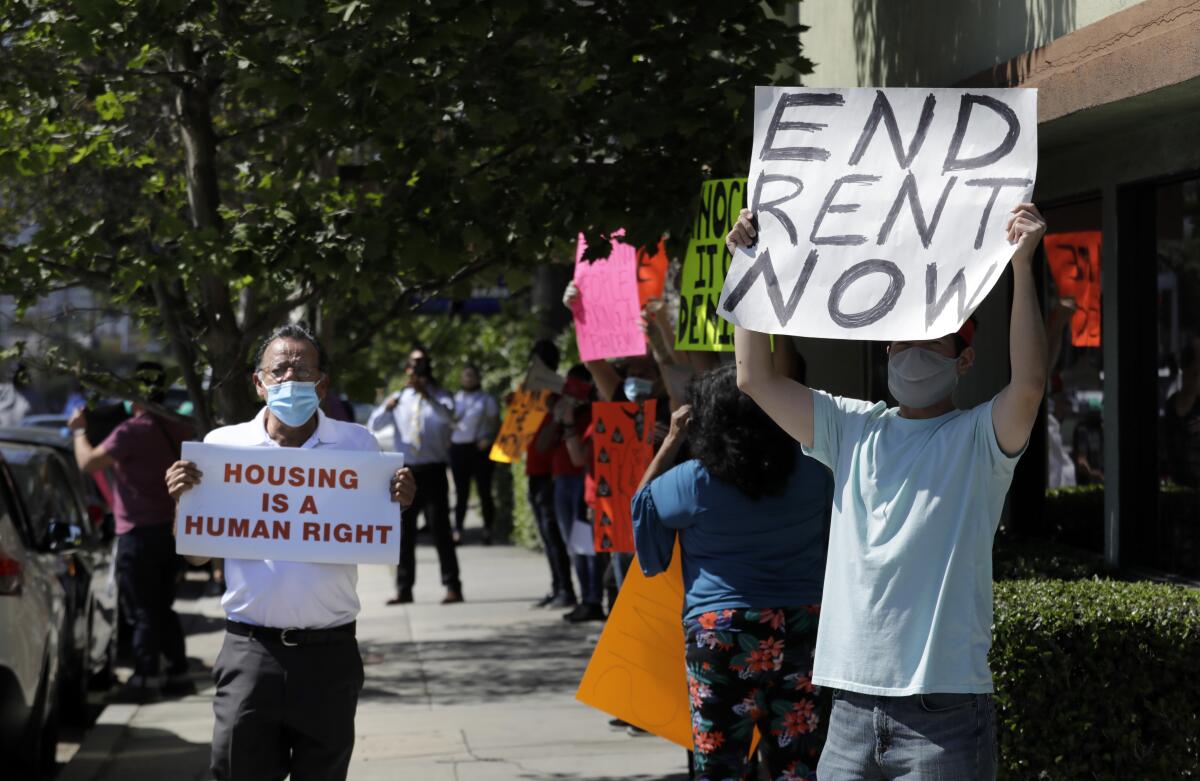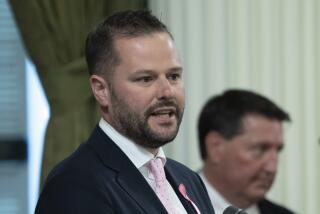California renters to receive COVID-19 eviction protections under bill signed by Gov. Gavin Newsom

SACRAMENTO — Gov. Gavin Newsom and the state Legislature acted Monday to avert a housing crisis by approving legislation to extend protections against evictions by five months for California renters facing financial hardship because of the COVID-19 pandemic.
Newsom signed the bill just before midnight, hours after it was approved in two-thirds votes of both houses of the state Legislature on Monday, the last day of this year’s session.
“COVID-19 has impacted everyone in California — but some bear much more of the burden than others, especially tenants struggling to stitch together the monthly rent, and they deserve protection from eviction,” Newsom said in a statement announcing the signing. “This new law protects tenants from eviction for non-payment of rent and helps keep homeowners out of foreclosure as a result of economic hardship caused by this terrible pandemic.”
The bill takes effect immediately as previous protections are set to expire at midnight Tuesday.
“That is why we must act today to establish new protections to get us through the next few months to prevent a wave of mass evictions in the middle of a public health emergency with no clear end in sight,” said Sen. Anna Caballero (D-Salinas) on Monday during floor debate on AB 3088.
Renters will not be evicted through Jan. 31 as long as they pay at least 25% of their rent and file a declaration with their landlord attesting that they are suffering financial hardship because of the pandemic and its related business shutdowns, which have put millions of Californians out of work.
“Our goal here was to protect tenants so they would not get evicted and to encourage the banks and get them involved and make sure they don’t foreclose on properties,” said Caballero, a coauthor of the bill.
The new law, which takes effect immediately, disappointed many tenant advocates who worry renters will still not be able to pay rent by Feb. 1, and they will still be on the hook for rent not paid in previous months, with landlords able to go to small claims court to collect.
Brian Augusta of the California Rural Legal Assistance Foundation said he supports the bill to head off evictions this week, but said tenants need further protection.
“We do not see this bill as the solution, and we have a lot more work to do,” he told senators at a public hearing on Saturday.
The legislation was drafted as a compromise after groups representing landlords warned that previous bills proposing one to three years of full rent waivers would have left many property owners, including small rental investors, without income to pay their mortgages, putting properties at the risk of foreclosure.
The ultimate solution would be for the federal government to provide tenants with financial assistance that allows them to pay their rent, said Debra Carlton, an executive vice president of the California Apartment Assn., which represents landlords.
“If rent continues to go unpaid, housing providers will either face foreclosures or, if they can, they will sell or convert their properties,” Carlton told lawmakers during the weekend hearing. “That may mean tenants will lose their homes in the end, and these smaller properties have historically been affordable housing. Losing these units will worsen California’s housing shortage.”
Newsom agreed that more financial help is needed from Washington.
“We need a real, federal commitment of significant new funding to assist struggling tenants and homeowners in California and across the nation,” the governor said.
In March, Newsom sought to slow the spread of the deadly virus by directing Californians to stay home and not to congregate in public places. Many businesses were forced to shut their doors or limit operations.
As a result, 11 million people have filed claims for unemployment insurance benefits since March.
In late March, Newsom issued an executive order briefly banning all renter evictions. The state Judicial Council later issued a moratorium on courts processing evictions and this month extended it through Sept. 1, and tenant groups warned the state would face a tidal wave of evictions unless additional action was taken.
“This is a temporary, stopgap measure,” Assemblyman David Chiu (D-San Francisco), an author of the bill, told colleagues Monday.
The bill approved by the Legislature on Monday, AB 3088, prevents landlords from evicting tenants for nonpayment of rent this year from March to Sept. 1. The prohibition continues from Sept. 1 to Jan. 31, 2021, for renters who pay at least 25% of their rent and file a declaration of financial hardship.
Tenants who make more than $100,000 or more than 130% of the area median income would be required to provide additional documentation to prove their financial hardship.
After Jan. 31, tenants could not be evicted for failing to pay full rent for the previous months, but renters can be evicted if they fail to pay rent for February and afterward.
The unpaid rent — both the amount owed since March and the portion unpaid during the next five months — would be treated as consumer debt, recoverable by a landlord only through small-claims court.
In cities and counties that have adopted strong tenant protections, those ordinances would remain in place until they expire, after which time state law would apply, officials said.
The measure was opposed by Ron Kingston, representing five housing groups including the Apartment Assn. of Orange County, the Apartment Assn. of California, Southern Cities and the East Bay Rental Housing Assn.
Kingston said it is unreasonable to allow renters to only pay a quarter of their rent for the next five months.
“Twenty-five percent is not anywhere near enough income for the owners to pay for repairs and maintenance,” Kingston said.
He also said renters should have to provide more proof of financial hardship than signing a declaration and criticized a provision that authorizes cities and counties to allow repayments of back rent as late as March 2022.
“That is simply too long,” Kingston said. “It will create massive strain. Bankruptcy or foreclosure may or will result. It will create financial hardship.”
The Senate approved the bill with two Republicans voting against it, three voting in favor and the others abstaining.
Sen. Hannah-Beth Jackson (D-Santa Barbara) supported the bill even though she angrily criticized the banking industry for not agreeing to stronger requirements that they approve forbearance of mortgage payments for struggling property owners.
The bill gives lenders broad leeway to turn down requests from many property owners for forbearance on mortgage payments, said Jackson, who is chairwoman of the Senate Judiciary Committee.
“It offers nothing of substance to borrowers,” Jackson said. “The banks and the mortgage holders aren’t doing a thing, and I can’t tell you how disappointed I am that they have not been willing to step up.”
Republican Sen. Andreas Borgeas of Modesto noted that federal law regulating banks limits what the state can do.
“California cannot dictate to the banks what they expect the banks to perform,” Borgeas said.
He said he “reluctantly” voted for the bill but warned he would not support any effort to extend it past Jan. 31.
Senate Republican leader Shannon Grove of Bakersfield abstained from voting, predicting that the restrictions on evictions would be challenged in court. Grove said she worries about property owners being able to fix roofs and make other needed repairs if rent is not coming in.
“Those things cost money every month that the landlords and these small landlords are continuing to have to pay for,” Grove said.
Democrats also said they would have preferred stronger protections against evictions, but noted time was running out for action.
“This is an imperfect solution to an unprecedented crisis,” said Sen. Bill Monning (D-Carmel), calling it a “stopgap measure.”
More to Read
Sign up for Essential California
The most important California stories and recommendations in your inbox every morning.
You may occasionally receive promotional content from the Los Angeles Times.











